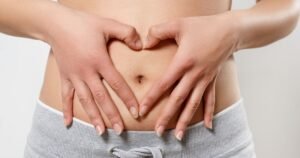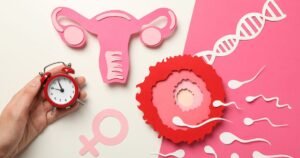Last Updated on 15 May 2024
Postpartum dryness is a common concern for many women who have recently given birth. It is a condition characterized by a lack of vaginal moisture, which can result in discomfort and pain during sexual intercourse. While postpartum dryness may not be openly discussed, women must understand that it is normal and can be managed.
During pregnancy, a woman’s body undergoes numerous hormonal changes, including increased estrogen and progesterone levels. These hormones play a crucial role in maintaining vaginal lubrication and overall vaginal health. However, after childbirth, hormone levels drop significantly, leading to a decrease in vaginal moisture.
Understanding the causes and duration of postpartum dryness is essential for women to know what to expect and how to manage the condition effectively. This guide will answer the question: How long does postpartum dryness last? We will explore the hormonal changes after childbirth, common physical changes experienced after delivery, the causes of postpartum dryness, the duration of the condition, and various ways to manage and treat it.
Understanding Postpartum Changes
\After giving birth, a woman’s body goes through a series of changes as it adjusts to no longer carrying a baby. Hormonal changes play a significant role in these postpartum changes. Estrogen and progesterone levels, which were high during pregnancy, drop rapidly after childbirth. These hormonal fluctuations can affect various aspects of a woman’s body, including the vagina.
The Impact of Childbirth on the Female Body
The process of childbirth, whether through vaginal delivery or cesarean section, can have a significant impact on the female body. Vaginal delivery, in particular, can cause stretching and tearing of the vaginal tissue, resulting in perineal pain. The vaginal canal may also become swollen and irritated, causing discomfort.
In addition to physical changes, hormonal shifts occur after childbirth, affecting hormone levels such as estrogen and progesterone. These hormones play a crucial role in maintaining vaginal lubrication and overall vaginal health. The sudden drop in hormone levels can lead to a decrease in vaginal moisture, resulting in postpartum dryness. Women need to understand that these changes are normal and temporary. With time and proper care, the body will adjust and return to its pre-pregnancy state.
Common Physical Changes After Delivery
After giving birth, women may experience various physical changes as their bodies recover. These changes can vary from woman to woman and may include perineal pain, postpartum thyroiditis, night sweats, milk production, and hot flashes.
Perineal pain is common after vaginal birth and is caused by stretching and tearing of the vaginal tissue. It can be managed with pain relief medication and proper hygiene.
Postpartum thyroiditis is a thyroid gland inflammation that can occur after giving birth. It can cause symptoms such as fatigue, weight gain, and vaginal dryness.
Night sweats are common during the postpartum period and are caused by hormonal fluctuations and the body’s adjustment to no longer being pregnant.
Milk production is a natural process that occurs after childbirth. Some women may experience an overproduction of milk, while others may struggle with low milk supply.
Hot flashes, similar to those experienced during menopause, can occur after giving birth due to hormonal changes. These heat flashes can be managed by dressing in layers and staying hydrated.
Women must remember that these physical changes are temporary and part of the body’s natural healing process after childbirth. If any concerns or persistent symptoms arise, it is advisable to consult with a healthcare provider.
Exploring Postpartum Dryness
Postpartum dryness refers to a lack of vaginal moisture experienced by women after giving birth. It is a common condition that can affect sexual intercourse and overall comfort. This dryness is primarily caused by hormonal changes, specifically decreased estrogen levels.
Estrogen is responsible for maintaining vaginal lubrication, blood flow to the genitals, and overall vaginal health. During pregnancy, estrogen levels are high, but they drop significantly after childbirth. This decrease in estrogen can result in vaginal dryness. Women need to understand the causes, duration, and management of postpartum dryness to address any discomfort and maintain their sexual well-being.
Causes of Vaginal Dryness After Birth
Several factors can contribute to vaginal dryness after childbirth. One of the main causes is the hormonal changes that occur during pregnancy and postpartum. The levels of estrogen and progesterone, two hormones that play a crucial role in maintaining vaginal lubrication, decrease significantly after giving birth. This decrease in estrogen levels can lead to a decrease in vaginal moisture and lubrication, resulting in dryness.
Another factor that can contribute to postpartum vaginal dryness is breastfeeding. Breastfeeding triggers the release of the hormone prolactin, which inhibits estrogen production. This decrease in estrogen levels can further exacerbate vaginal dryness.
In addition to hormonal changes, other factors, such as stress, fatigue, and certain medications, can also contribute to vaginal dryness after childbirth. It is important to remember that every woman’s body is different, and the severity and duration of postpartum dryness can vary.
How Hormonal Shifts Contribute to Dryness
Hormonal shifts play a significant role in postpartum vaginal dryness. During pregnancy, the body experiences an increase in estrogen and progesterone levels, which help maintain the health and elasticity of the vaginal tissues. However, after giving birth, these hormone levels drop dramatically. Estrogen, in particular, is responsible for maintaining vaginal lubrication and blood flow to the genital area. When estrogen levels decrease, the vaginal tissues can become dry, thin, and less elastic.
Progesterone, on the other hand, prepares the uterus for implantation and supports the growth of the uterine lining during pregnancy. After childbirth, progesterone levels also decrease, which can further contribute to vaginal dryness.
The menstrual cycle also plays a role in vaginal dryness. During the menstrual cycle, estrogen and progesterone levels fluctuate. The decrease in hormone levels during the menstrual cycle can lead to temporary vaginal dryness.
Overall, the hormonal shifts that occur during pregnancy, childbirth, and the postpartum period can contribute to vaginal dryness. Understanding these hormonal changes can help women navigate this common postpartum symptom.
How long does postpartum dryness last?
The duration of postpartum dryness can vary from woman to woman. For some women, vaginal dryness may last for a few weeks or a couple of months after giving birth, while for others, it may persist for a longer time.
The main factor influencing the duration of postpartum dryness is the return of estrogen to pre-pregnancy levels. Estrogen plays a crucial role in maintaining vaginal lubrication. After childbirth, estrogen levels drop significantly, and it takes time for them to return to normal.
It is important to note that postpartum dryness is temporary and usually resolves as hormone levels stabilize. However, if vaginal dryness persists or causes discomfort, it is advisable to seek medical advice for appropriate treatment options.
Typical Timeline for Recovery
The recovery time for postpartum dryness can vary depending on various factors, including hormonal changes and the body’s healing process. On average, most women experience a resolution of vaginal dryness within a few months after giving birth.
In the first few weeks postpartum, the body undergoes significant hormonal changes and begins healing. During this time, it is common for women to experience vaginal dryness as hormone levels fluctuate.
As the body continues to recover and hormone levels stabilize, vaginal dryness typically improves. By the end of the first three to six months postpartum, many women find that their vaginal moisture levels return to normal.
It is important to remember that every woman’s recovery timeline is unique, and some may experience a longer duration of postpartum dryness. If vaginal dryness persists or causes discomfort beyond the typical recovery period, it is advisable to consult a healthcare provider for further evaluation and guidance.
Factors That Influence Recovery Time
Several factors can influence the recovery time for postpartum dryness. One of the main factors is breastfeeding. Breastfeeding can affect hormone levels, particularly estrogen, which plays a key role in maintaining vaginal lubrication. The continued production of breast milk can prolong the decrease in estrogen levels, potentially prolonging postpartum dryness.

Other hormonal changes, such as those associated with the menstrual cycle, can also impact the recovery time. The fluctuation of hormone levels during the menstrual cycle can affect vaginal moisture and contribute to postpartum dryness.
Individual differences in hormone production and healing processes can also influence recovery time. Some women may naturally recover faster, while others may take longer to fully resolve postpartum dryness.
Overall, several factors can affect how long postpartum dryness lasts, so it’s crucial to be patient and give self-care top priority during the healing process.
Managing and Treating Postpartum Dryness
Managing and treating postpartum dryness can involve a combination of home remedies, lifestyle changes, and, in some cases, medical interventions. Here are some approaches that can help alleviate discomfort and promote vaginal moisture:
- Using a water-based lubricant during sexual activity can reduce friction and improve comfort.
- Applying a vaginal moisturizer regularly will hydrate and soothe the vaginal tissues.
- Maintain good hydration by drinking plenty of water throughout the day.
- Avoiding douches and harsh soaps, as they can disrupt the natural pH balance of the vagina.
- Wear loose and breathable clothing to prevent moisture buildup and irritation.
- Consider hormone replacement therapy or other medical interventions under the guidance of a healthcare provider.
It is essential to consult a healthcare provider if postpartum dryness persists or causes significant discomfort, as they can provide personalized recommendations and ensure there are no underlying medical conditions contributing to the symptoms.
Effective Home Remedies and Lifestyle Changes
There are several effective home remedies and lifestyle changes that can help manage and alleviate postpartum dryness:
- Use a water-based lubricant: Applying a water-based lubricant during sexual activity can help reduce friction and discomfort caused by vaginal dryness.
- Increase moisture levels: Drinking plenty of water throughout the day can help hydrate the body and promote overall moisture levels, including vaginal moisture.
- Avoid harsh soaps and douches: Using gentle, pH-balanced soaps for intimate hygiene and avoiding douches can help maintain the natural balance of the vaginal flora, preventing further dryness and irritation.
- Wear breathable clothing: Opt for loose-fitting, breathable underwear and clothing to promote air circulation and prevent moisture buildup, which can exacerbate dryness.
- Consider using a vaginal moisturizer: Applying a vaginal moisturizer regularly can help restore and maintain vaginal moisture levels. Look for products specifically designed for postpartum dryness.
By incorporating these home remedies and lifestyle changes into your daily routine, you can help manage and alleviate postpartum dryness, providing relief and promoting overall vaginal health.
When to Seek Medical Advice
While postpartum dryness is a common condition, there may be cases where medical advice is necessary. It is advisable to consult a healthcare provider if:
- Postpartum dryness persists for an extended period or worsens over time.
- Discomfort or pain during sexual activity becomes severe or affects your daily life.
- Vaginal dryness is accompanied by other concerning symptoms, such as itching, burning, or abnormal discharge.
- You experience signs of infection, such as fever, foul odor, or increased pain.
- The dryness is causing significant emotional distress or impacting your quality of life.
A healthcare provider can evaluate your symptoms, determine the underlying cause of your postpartum dryness, and recommend appropriate treatment options. They may also check for any underlying medical conditions that could be contributing to the dryness.
Sexual Health After Childbirth
Sexual health after childbirth can be impacted by various factors, including vaginal dryness, discomfort, and changes in the pelvic floor muscles. It is important to approach sexual activity with patience, open communication, and a focus on mutual comfort and pleasure. Some tips for navigating sexual health after childbirth include:
- Engaging in open and honest communication with your partner about your needs and concerns.
- Experimenting with different positions and techniques that are comfortable and enjoyable for both partners.
- Incorporating pelvic floor exercises into your routine strengthens the pelvic floor muscles and improves overall sexual function.
- Using lubricants and vaginal moisturizers to alleviate discomfort and promote moisture during sexual activity.
- Seeking professional guidance from a healthcare provider or pelvic floor therapist if you are experiencing persistent discomfort or difficulties with sexual activity.
By prioritizing open communication, self-care, and patience, you can navigate the challenges of postpartum sexual health and achieve a fulfilling and enjoyable sexual experience.
Resuming Sexual Activity Safely
Resuming sexual activity after childbirth requires patience, communication, and a focus on comfort. Here are some tips for resuming sexual activity safely:
- Wait until you feel physically and emotionally ready: It is important to wait until your body has healed and you feel emotionally prepared for intimacy. This can vary from person to person and may take several weeks or even a few months.
- Use lubrication: Vaginal dryness is common after childbirth, so using a water-based lubricant can help reduce discomfort and improve comfort during sexual activity. Avoid using petroleum-based lubricants, as they can degrade latex condoms.
- Communicate with your partner: Open and honest communication with your partner about your needs, concerns, and any discomfort you may be experiencing is essential. This will help ensure that both partners are on the same page and can work together to create a pleasurable and comfortable experience.
Remember, every couple’s journey back to sexual activity after childbirth is unique. It is important to prioritize your own comfort and well-being and seek medical advice if you have any concerns or persistent discomfort.
Navigating Challenges and Communication with Your Partner
Navigating the challenges of postpartum sexual health requires open and honest communication with your partner. Here are some tips for effective communication and maintaining a healthy sexual relationship:
- Talk openly about your needs and concerns: Discuss any discomfort, changes in desire, or emotional challenges you may be experiencing. Be open to listening to your partner’s thoughts and concerns as well.
- Prioritize emotional closeness: Intimacy is not solely about sexual activity. Focus on building emotional closeness through other forms of affection, such as cuddling, kissing, and spending quality time together.
- Be patient and understanding: Remember that both you and your partner are adjusting to the changes brought on by childbirth. Give yourselves time to reconnect emotionally and physically.
- Seek professional support if needed: If you are experiencing persistent challenges or difficulties, consider seeking the guidance of a healthcare provider or couples therapist. They can provide support and guidance tailored to your specific situation.
By fostering open communication and maintaining a supportive and understanding attitude, you and your partner can navigate the challenges of postpartum sexual health and strengthen your relationship.
The Role of Diet and Nutrition
Diet and nutrition play a crucial role in postpartum recovery and overall vaginal health. A balanced and nutritious diet can support hormonal balance and promote overall well-being. Here are some key considerations:
- Eat a variety of nutrient-dense foods: Focus on consuming a diverse range of fruits, vegetables, whole grains, lean proteins, and healthy fats to ensure you’re getting a wide range of essential nutrients.
- Stay hydrated: Drinking an adequate amount of water and staying well-hydrated is important for overall health and can help maintain vaginal moisture.
- Support hormonal balance: Include foods rich in omega-3 fatty acids, such as salmon and chia seeds, which can help support hormonal balance. Also, consider foods that contain phytoestrogens, such as soy and flaxseeds, which have estrogen-like effects in the body.
- Consider supplements: Discuss with your healthcare provider whether any dietary supplements, such as omega-3 fatty acids or probiotics, may be beneficial for your postpartum health.
By prioritizing a balanced and nutritious diet, you can support your postpartum recovery and promote overall vaginal health.
Foods That Promote Healing and Moisture
Certain foods can promote healing and moisture in the body, which can be beneficial for postpartum vaginal dryness. Here are some foods to consider incorporating into your diet:
- Foods rich in healthy fats: Avocados, salmon, and nuts are excellent sources of healthy fats, which can support overall hormonal balance and moisturize the body from the inside out.
- Hydrating fruits and vegetables: Watermelon, cucumbers, and oranges are high in water content and can help keep the body hydrated, including the vaginal tissues.
- Foods rich in vitamin E: Almonds, spinach, and sunflower seeds contain vitamin E, which promotes skin health and can help maintain vaginal moisture.
- Fermented foods: Yogurt, kefir, and sauerkraut are examples of fermented foods that contain probiotics, which can support a healthy vaginal microbiome and overall vaginal health.
While diet alone may not completely resolve postpartum vaginal dryness, incorporating these foods into your diet can support overall healing and improve moisture levels in the body.
Hydration and Its Importance
Staying well-hydrated is essential for overall health and can play a role in maintaining vaginal moisture. Here’s why hydration is important and some tips to stay hydrated:
- Moisture balance: Proper hydration helps maintain moisture levels in the body, including the vaginal tissues. Drinking an adequate amount of water can help prevent dryness and promote overall vaginal health.
- Skin health: Adequate hydration supports skin health, including the delicate skin of the vaginal area. Well-hydrated skin is less prone to dryness, irritation, and discomfort.
- Tips for staying hydrated: Drink water throughout the day, aim for at least 8 cups (64 ounces) of water daily, and include hydrating foods, such as fruits and vegetables, in your diet. Limit the consumption of sugary and caffeinated beverages, as they can contribute to dehydration.
By prioritizing hydration and incorporating hydrating habits into your daily routine, you can support overall vaginal health and maintain moisture levels in the body.
Physical Therapy and Exercises
Physical therapy and exercises, specifically pelvic floor exercises, can play a significant role in postpartum recovery and improving vaginal health. Here’s why physical therapy is important and some exercises to consider:
- Strengthening the pelvic floor muscles: Pregnancy and childbirth can weaken the pelvic floor muscles, which support the bladder, uterus, and rectum. Pelvic floor exercises, also known as Kegel exercises, can help strengthen these muscles and improve overall pelvic floor function.
- Promoting healing and recovery: Physical therapy can aid in the recovery process after childbirth, supporting the healing of any perineal tears or surgical cuts.
- Improving sexual function: Strengthening the pelvic floor muscles can lead to improved sexual function, including increased vaginal tone and sensitivity.
- Working with a physical therapist: It is advisable to consult a physical therapist who specializes in pelvic floor health to ensure proper technique and guidance for pelvic floor exercises.
By incorporating pelvic floor exercises into your postpartum routine and working with a physical therapist, you can promote healing, improve vaginal health, and enhance overall pelvic floor function.
Pelvic Floor Exercises to Aid Recovery
Pelvic floor exercises, also known as Kegel exercises, can aid in postpartum recovery and help improve the strength and function of the pelvic floor muscles. Here are some exercises to consider:
- Kegels: Squeeze the muscles around your vagina as if you are trying to stop the flow of urine. Hold the contraction for a few seconds, then release. Repeat this exercise several times a day.
- Bridge pose: Lie on your back with your knees bent and feet flat on the floor. Lift your hips off the ground, engaging your pelvic floor muscles. Hold for a few seconds, then lower your hips back down. Repeat this exercise several times.
- Squats: Stand with your feet shoulder-width apart and lower yourself into a squatting position, keeping your back straight. Engage your pelvic floor muscles as you rise back up. Repeat this exercise several times.
For optimal results, it is important to perform these exercises correctly and consistently. If you are unsure about proper technique or have any concerns, it is advisable to consult a physical therapist who specializes in pelvic floor health.
The Benefits of Professional Guidance
Seeking professional guidance, such as working with a physical therapist or healthcare provider, can provide numerous benefits regarding pelvic floor exercises and postpartum recovery. Here are some advantages of seeking professional guidance:
- Proper technique: A physical therapist or healthcare provider can ensure that you perform pelvic floor exercises correctly, maximizing their effectiveness and minimizing the risk of injury.
- Personalized approach: Everyone’s postpartum recovery is unique, and professional guidance allows for a personalized approach tailored to your specific needs and goals.
- Addressing individual concerns: A physical therapist or healthcare provider can address specific concerns such as pain, discomfort, or any underlying conditions that may be impacting your pelvic floor health.
- Monitoring progress: Working with a professional allows for regular monitoring of your progress, ensuring that you are on track and making appropriate adjustments as needed.
By seeking professional guidance, you can optimize the benefits of pelvic floor exercises and ensure a safe and effective postpartum recovery.
Postpartum dryness is a common concern for many women after childbirth. Understanding the changes your body undergoes and how hormonal shifts can contribute to this issue. Typically, postpartum dryness lasts a few weeks to a few months, but various factors can influence the recovery time. Managing and treating postpartum dryness involves effective home remedies, lifestyle changes, and seeking medical advice. Resuming sexual activity safely and maintaining good hydration and nutrition is also crucial in aiding recovery. Remember, caring for your well-being during this postpartum period is essential. You can explore related articles on postpartum care and recovery.









